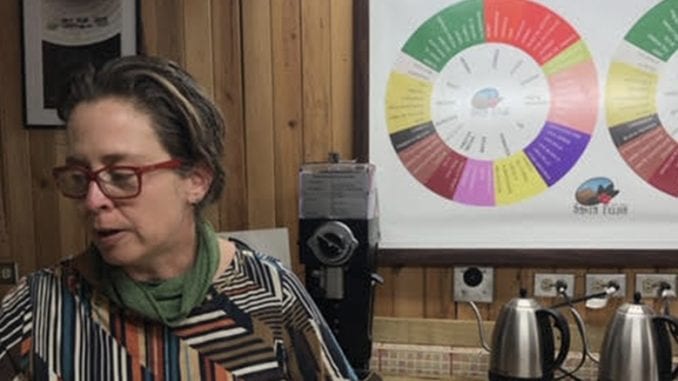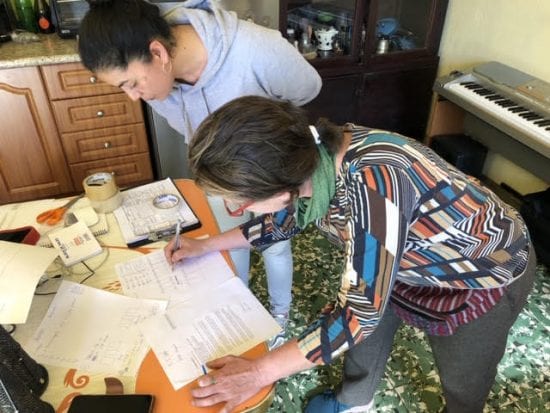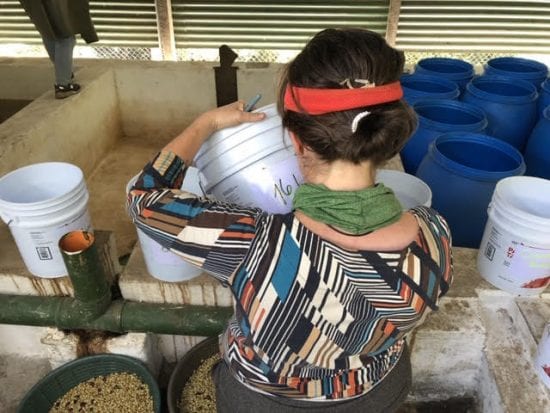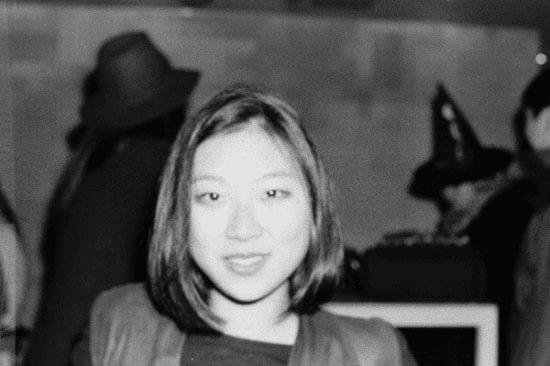
We chat with the fourth-generation coffee producer, Q Grader, and Q Processor, whose family won the Cup of Excellence in 2017.
BY JIYOON HAN
SPECIAL TO BARISTA MAGAZINE ONLINE
Photos courtesy of Jiyoon Han
Now fourth-generation coffee producers, the Meneses siblings operate the Santa Felisa farm, keeping to its founding values of integrity, quality, loyalty, and justice. Established in 1904, Santa Felisa is in the town of Acatenango in Guatemala’s Chimaltenango department, and their slow-dried natural Pacamara won first place in the 2017 Guatemala Cup of Excellence.
What follows is the first part of a recent Zoom conversation I had with Anabella Meneses—agronomist, ecologist, Q Grader, and Q Processor—who manages the production of every coffee lot at the farm. Anabella and her siblings believe that producing better-quality coffee is directly linked to improving the quality of life for its producers and the community at large. During our talk, Anabella spoke about her relationship to coffee, her feelings on winning first place at COE, and more.

Jiyoon Han: What does coffee mean to you?
Anabella Meneses: Coffee is a delicious beverage that is produced by different kinds of producers, and it gets its perfect expression when it is produced with love. This beverage can unite cultures. For me, coffee made with love is for coffee lovers, and it can create fantastic stories, from the person that is working with coffee to the person that is roasting the coffee, until the consumer that enjoys this coffee. It can create beautiful stories when it is made with love. That’s coffee for me.
What is your first memory of coffee as a child?
I think the first memory is from when I was 5 years old, playing with the kids here at the farm between the coffee trees. My most beautiful time in my childhood was discovering nature, playing with fire, with water and soil, feeling the air between the bushes, running with the kids. I’m now working with the guys I was playing with when I was a little girl. For me this has a lot of meaning because I love the people I work with. We were friends when we were children.
I grew up in Guatemala City. My grandmother was always here tending to the plantation and I came to visit her during vacation. I admired Grandma. She also had cows and made cheese here. This kind of life in nature was amazing. I thought of farming as something only beautiful before starting to see the economics and commoditization of coffee.
Did you always want to join the family business? How has this evolved over time?
Yes. For me it was beautiful to be here, to see my grandmother. The feeling of taking care of the animals and the plants is beautiful. When I was younger I wanted to work with coffee. I studied biology first then agronomy before coming to Santa Felisa in 2008 to run the farm.
My siblings Antonio and Lucia are involved with the coffee farm, but more in the legal issues, taxes, sales, and logistics. We really do direct trade well. We work with nano-lots and micro-lots. This needs a lot of paperwork internally and to continue traceability, to ensure that the coffee gets to the door of the client. We are together in complete control of operations, from real farming to exporting nano-lots. It’s a lot of work and we work happily together.

What was your experience like winning first place in the Guatemala Cup of Excellence in 2017?
It was amazing. In 2015 and 2016 I was already with my cupping lab (at Santa Felisa). I was tasting such amazing coffees. I was like, “Wow!” People began to talk about it and they were asking why we were not participating in COE. In 2016 we sent the Gesha and got second place. Then the next year we won first prize with Pacamara. Unbelievable! This farm was going forward. My dreams were coming true! In 2018, we worked to make this farm a beautiful example to lead the industry. This was exciting to see.
To see my dad who passed away last year, to see his face and his happiness, his realization, was really amazing. The Cup of Excellence prizes gave confidence to the people at the farm. When you change things from how they were done in the past, the first barrier will be your workers who have been working in coffee all their lives, to change the minds of people grounded in tradition, is difficult to do.
After COE, clients were asking me to visit them, [in] Korea and Australia for example. It is beautiful to see both sides, the clients and the growers, through sharing.
We will continue this conversation next week.

ABOUT THE AUTHOR
A native New Yorker, Jiyoon Han is a Q Arabica Grader, Q Processing Generalist, and was a judge for the U.S. Coffee Championships 2019 Brewers Cup Prelims. As Chief Daughter at Bean & Bean Coffee in NYC, Jiyoon sources, roasts, and cups coffee. She’s a student at the Harvard Business School, where she is co-president of the Coffee & Tea Club.

